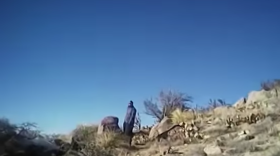In a historic trial earlier this year, a jury weighed the fates of two former Albuquerque police officers who shot and killed James Boyd. Three jurors could not be swayed from a guilty verdict.
The deadlock resulted in a mistrial, and days after it was announced, KUNM’s Marisa Demarco met with one of those jurors—Robby Heckman—in the Foothills of the Sandia Mountains. There, a small white cross marks the spot James Boyd stood before he was killed.
HECKMAN: So when the judge released us, I immediately left the courthouse and came directly here. And to my surprise, one of the other jurors was here with me. And we stood here, and we talked like we’ve never been able to talk. You know, participating in the trial as I did as a juror, you know, I’m realizing that that was a very traumatic experience for me, and I think it was a very traumatic experience for our community.
KUNM: What is it that you consider when you’re up here?
HECKMAN: So I’ve been thinking about what step’s next. I think the trial was a microcosm of a much larger and systemic problem in our society and our community, specifically in Albuquerque, of what I’ll just call it what I think it is: illegitimate policing.

KUNM: What was it like during the deliberations? You guys deliberated for 16 hours. I mean, what happened in there?
HECKMAN: It was a very thoughtful deliberation. It was not, as people might imagine, highly contentious. It was very respectful. There were clearly very sharp differences of opinion on what the evidence showed.
It was frustrating to me that the jurors seemed to so naturally and easily empathize with the officers, and suggest that that was reasonable. And we went over the video multiple multiple times, and people kept saying “Look, there he is pulling the knives out.” And the other of us are like, “Yeah, and there he is turning.”
And right as he’s turning, he says, “It’s not nice to make fun of people.” And, I just, being a fellow human being, I don’t perceive that as someone who’s about to attack officers with three-inch knives who have high-powered rifles trained directly at him.
KUNM: Do you think the difference between you and the jurors who disagree with you is who you have empathy for?
HECKMAN: I think that’s part of it, but I guess I have to say I have great empathy for James Boyd, and the standard, if you will, that I used was would a reasonable person—a reasonable officer—do the same thing in that situation?
In the jury room, James Boyd seemed to remain this kind of abstraction, an object of fear that quite frankly the defense painted him to be. You know, and I don’t know. I don’t know what people’s direct experience with mental illness or homelessness were. I mean other people on the jury. But that might be difficult for people to empathize with the situation that James Boyd was in.
KUNM: Why do you think you were traumatized by the trial?
That’s a good question. I think I was kind of numb during the trial. I don’t know if I was in touch with that. There was a point during the closing arguments where I was having a very physiological response. I didn’t know whether I was going to pass out or vomit or just burst into tears. I was able to compose myself. But I think because it is symptomatic of so many of our much larger social issues, and I’m just one person, a cog, if you will, in this process. But it was important. And it was overwhelming for me personally. It’s the most emotionally and intellectually exhausting thing that I’ve ever done as an adult.

But I was very humbled by the experience, and now I want to move forward and I want to, I do want to engage in this community. And James Boyd was one of our most vulnerable. I do think that a measure of society is how we address that. But it takes political will. It takes radical social change, and I’m hopeful to be a part of that.











